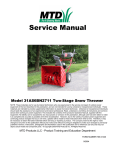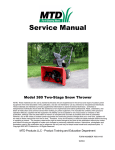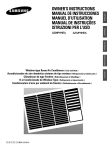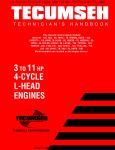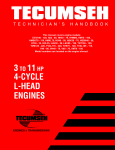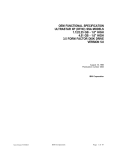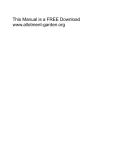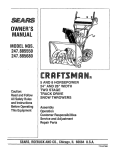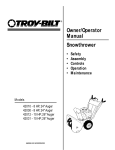Download MTD 31AE5MLG729 Service manual
Transcript
Service Manual 31AE5MLG729 Two-Stage Snow Thrower NOTE: These materials are for use by trained technicians who are experienced in the service and repair of outdoor power equipment of the kind described in this publication, and are not intended for use by untrained or inexperienced individuals. These materials are intended to provide supplemental information to assist the trained technician. Untrained or inexperienced individuals should seek the assistance of an experienced and trained professional. Read, understand, and follow all instructions and common sense when working on power equipment. This includes the contents of the product’s Operators Manual, supplied with the equipment. No liability can be accepted for any inaccuracies or omission in this publication, although care has been taken to make it as complete and accurate as possible at the time of publication. However, due to the variety of outdoor power equipment and continuing product changes that occur over time, updates will be made to these instructions from time to time. Therefore, it may be necessary to obtain the latest materials before servicing or repairing a product. The company reserves the right to make changes at any time to this publication without prior notice and without incurring an obligation to make such changes to previously published versions. Instructions, photographs and illustrations used in this publication are for reference use only and may not depict actual model and component parts. © Copyright 2005 MTD Products Inc. All Rights Reserved. MTD Products LLC - Product Training and Education Department FORM NUMBER 769-01418 9/2004 TABLE OF CONTENTS General Information ....................................................................................................1 Tire Pressure .............................................................................................................2 Chute Installation ........................................................................................................2 Skid Shoe and Shave Plate Adjustment .................................................................... 2 Shave Plate Adjustment ............................................................................................. 3 Drive Control Cable Adjustment ................................................................................. 3 Auger Control Testing and Adjustment ...................................................................... 4 Shift Rod Adjustment ................................................................................................. 5 Auger Belt Replacement ............................................................................................ 5 Drive Belt Replacement ............................................................................................. 6 Friction Wheel Removal ............................................................................................. 6 Planetary Gear Removal ............................................................................................ 8 Drive Shaft Removal .................................................................................................. 9 Axlw Shaft Removal ................................................................................................. 10 Splitting the Unit ....................................................................................................... 11 FRiction Wheel Disc Disassembly ............................................................................ 13 Auger Pulley Removal .............................................................................................. 14 Auger and Impeller Removal .................................................................................... 14 Auger and Impeller Notes ......................................................................................... 15 Reducer Transmission ............................................................................................. 16 Reduction Transmission Disassembly ..................................................................... 16 Auger Idler Arm ........................................................................................................ 16 31AE5MLG729 Snow Thrower GENERAL INFORMATION 31AE5MLG729 The Owner’s Manual packet includes and engine manual, extra shear pins and cotter pins as well as a packet containing a sample of Sta-Bill fuel stabilizer that will treat up to 2 ½ gallons of regular gas. CAUTION: When assembling the handle for the first time, use caution when lifting the handle. The shift lever rod can get caught on the lower handle cross member and if forced into position can bend the spring shift lever. If necessary, move the shift rod in front of the cross member as you raise the handle into position. There are two Supplement Sheets dated July 19 2004 and July 20, 2004 – Subject: Connector Sleeve on Two Stage Snow Thrower shift rod. (Styles: E, F, H, K, L, N, O, P and Q.) Vibration may cause the rod connector sleeve to slide up out of position. The remedy is to slide the connecter sleeve fully down. Secure it in place by placing a rubber bushing over the top of the lower shift rod OR the upper shift rod.. (A small piece of gas line can be used as a bushing.) This will prevent the sleeve from sliding up the shaft. See Figure 1. YARD MACHINES SNOW THROWER Model 31AE5MLG729 • Serial Number 1G024B10168 • Two Stage – 4 Cycle HMSK80-110 – 10.5 HP • 28” Xtreme Auger • 21” Intake Height • Tecumseh Engine With Electric Start • Power Steering • 4 – Way Discharge Chute Control • 6 Forward Speeds and 2 Reverse Speeds • Built in Halogen Light • Fully assembled with oil in engine • The 4-way discharge chute control: for quick and easy snow directional changes. • Power Steering: For ultimate maneuverability • XTREME Auger: Break down of ice and snow before pushing the pieces into the impeller. • Built-in Halogen Light: For use in early morning or evening. Rubber Bushing Rod Connector Sleeve Figure 1 Rubber bands hold the Auger and Drive control cables in their respective nylon pulleys during shipping and generally break during assembly of the handle. Remove any pieces of rubber band after assembly. 1 There is a storage area in the handle panel used for holding the spare auger shear pins. See Figure 2. 2.3. Pull the hairpin clip out of the clevis pin on the chute support rod. Save the hardware. 2.4. Insert the round end of the chute control box on the short tube of the chute assembly. See Figure 4. Shear Pins Storage Area Figure 2 1. Chute Control TIRE PRESSURE Figure 4 Before operating, check tire pressure. Both tires should be between 15 psi and 20 psi. NOTE: If the tire pressure is not equal in both tires, the unit may pull to one side or the other during operation. 2. CHUTE INSTALLATION 2.1. Apply a light lubricant to the rim/lip of the chute base (and the underside of the chute assembly) and position the chute over the base. 2.2. Close the flange keepers to secure the chute to the base. See Figure 3. 2.5. Insert the other end of the chute control box into the chute support tube. 2.6. Insert the clevis pin, removed earlier, through the holes on the chute control box and the chute support rod. Secure with the hairpin clip. See Figure 5. Flange Keepers Clevis Pin Figure 5 3. Figure 3 SKID SHOE AND SHAVE PLATE ADJUSTMENT The space between the shave plate and the ground can be adjusted. NOTE: If the flange keepers will not easily click into place, use the palm of your hand to apply swift, firm pressure to the back of each. For close snow removal on a smooth surface, raise skid shoes higher on the auger housing to lower the 2 shave plate. 4.1. Use a middle or lower position when the area to be cleared is uneven, such as a gravel driveway. Remove the carriage bolts and hex nuts, which attach it to the snow thrower housing. See Figure 7. CAUTION: Loose gravel can be picked up and thrown by the auger, causing injury to the operator and bystanders and/or damage to the snow thrower and surrounding property. Carriage Bolts For initial adjustment we recommend placing the shave plate on a piece of cardboard. 3.1. Loosen the four hex nuts (two on each side) and carriage bolts attaching the skid shoes to the auger housing. See Figure 6. Hex Nuts Figure 7 3.3. Tighten the hex nuts. NOTE: Make certain the entire bottom surface of skid shoe is against the ground to avoid uneven wear on the skid shoes. 4. 4.3. Tighten nuts securely. 5. DRIVE CONTROL CABLE ADJUSTMENT Check the adjustment of the drive control as follows: Figure 6 Move the skid shoes to the ground. Install a new shave plate, making sure the heads of the carriage bolts are to the inside of housing. When the drive control is released and in the disengaged, or "up" position, the cable should have very little slack. It should NOT be tight. Skid Shoe 3.2. 4.2. SHAVE PLATE REPLACEMENT The shave plate will wear over time. It can be replaced when worn excessively. NOTE: You willl need to remove the skid shoes prior to removing the shave plate. 5.1. With the drive control released, push the snow thrower gently forward. The unit should roll freely. 5.2. Engage the drive control and gently attempt to push the snow thrower forward. The wheels should not turn. The unit should not roll freely. 5.3. With the drive control released, move the shift lever back and forth between the R2 position and the F6 position several times. There should be no resistance in the shift lever. If any of the above tests failed, the drive cable is in need of adjustment. 3 5.4. 6.4. Loosen the hex jam nut on the auger control cable "Z" fitting and rotate the coupling end of the cable downward to provide more slack or upward to take up slack. See Figure 8. To readjust the control cable, loosen the hex jam nut on the auger control cable "Z" fitting. Rotate the coupling end of the cable counterclockwise to provide more slack. Retighten the hex jam nut. See Figure 9. Hex Jam Nut Hex Jam Nut Figure 8 Figure 9 5.5. Retighten the hex jam nut and repeat all three tests to verify proper adjustment has been achieved. 6. AUGER CONTROL TESTING AND ADJUSTMENT 6.1. Start the engine and run it at full throttle. 6.2. While standing in the operator position, engage the auger. Do this several times. 6.3. Release the auger control and walk to the front of the unit. Confirm that the auger has completely stopped rotating and shows NO signs of motion. 6.5. Repeat Auger Control Test to verify proper adjustment has been achieved. WARNING: Never attempt to make any adjustments while the engine is running, except where specified in operator's manual. The augers are secured to the spiral shaft with four shear pins and cotter pins. If the auger should strike a foreign object or ice jam, the snow thrower is designed so that the pins may shear. See Figure 10. Shear Pins IMPORTANT: If the auger shows ANY signs of rotating, immediately return to the operator's position and shut off the engine. Wait for ALL moving parts to stop before re-adjusting the auger control. Figure 10 If the augers will not turn, check to see if the pins have sheared. One set of replacement shear pins has been provided with the snow thrower. 4 When replacing pins, spray an oil lubricant into shaft before inserting new pins. 7. 8. AUGER BELT REPLACEMENT 8.1. Using a 3/8” socket and extension, remove the two self-tapping screws securing the plastic belt cover to the frame. See Figure 13. SHIFT ROD ADJUSTMENT If the full range of speeds (forward and reverse) cannot be achieved, adjust the shift rod. 7.1. Place the shift lever in the fastest forward speed position and remove the hairpin clip which secures the ferrule to the shift lever. See Figure 11. Hairpin Clip Ferrule Slf Tapping Screws Figure 13 8.2. Roll the auger belt off the engine pulley. See Figure 14. Figure 11 7.2. Auger Belt Rotate the shift arm down as far as it will go. See Figure 12. Engine Pulley Figure 14 NOTE: Place a scewdriver under the belt as you pull slowly on the starter cord to wind the belt off the pulley Shift Arm Figure 12 8.3. Drain the gasoline from the snow thrower, or place a piece of plastic under the gas cap. 7.3. Thread the ferrule up or down the shift rod until it aligns with the hole in the shift lever. 8.4. Disconnect the spark plug wire from the spark plug. 7.4. Re-secure the ferrule with the hairpin clip removed earlier. 8.5. Carefully pivot the snow thrower up and forward so that it rests on the auger housing. 5 8.6. To remove and replace your snow thrower's drive belt, proceed as follows: Using a 3/8” socket, remove the four self-tapping screws which secure the frame cover to the frame. See Figure 15. 9.1. Follow steps 8.1 through 8.6 in the AUGER BELT REMOVAL Section. Then continue with the following steps. 9.2. Use a length of starter cord to pull the drive belt idler pulley toward the right, away from the belt. See Figure 17. Starter Cord Self Tapping Screws Figure 15 8.7. Wood Block Using a piece of starter cord, unhook the support bracket spring from the frame. See Figure 16. Figure 17 Starter Cord 9.3. Wedge a piece of wood under the pulley to hold it in position. 9.4. Roll the drive belt off engine pulley. 9.5. Slip the drive belt off the pulley and between friction wheel and friction wheel disc. See Figure 18. Support Bracket Spring Friction Wheel Disc Figure 16 Drive Belt 8.8. Using a 9/16” socket and a ¾” wrench, loosen and remove the shoulder screw which acts as a belt keeper. 8.9. Remove the belt from around the auger pulley, and slip the belt between the support bracket and the auger pulley 8.10. Reassemble auger belt by following instructions in reverse order. Figure 18 IMPORTANT: DO NOT forget to reinstall the shoulder screw and reconnect the spring to the frame after installing a replacement auger belt. 9. 9.6. DRIVE BELT REPLACEMENT 6 Remove and replace belt in the reverse order. 10. FRICTION WHEEL REMOVAL 10.7. Using a ½” socket remove the screws and bell washers securing the wheels to the axles. Remove both wheels. See Figure 20. If the snow thrower fails to drive with the drive control engaged, and performing the drive control cable adjustment fails to correct the problem, the friction wheel may need to be replaced. 10.1. Examine the friction wheel for signs of wear or cracking and replace if necessary. 10.2. Place the shift lever in second reverse (R2) position. 10.3. Drain the gasoline from the snow thrower, or place a piece of plastic under the gas cap. 10.4. Disconnect the spark plug wire from the spark plug. 10.5. Carefully pivot the snow thrower up and forward so that it rests on the auger housing. 10.6. Using a 3/8” socket, remove the four self-tapping screws that secure the frame cover to the frame. See Figure 19. Figure 20 10.8. Using a 3/8” socket, remove the four screws securing the right drive cover to the frame. Remove the drive cover. Repeat for the left drive cover. See Figure 21. Self Tapping Screws Screws Right Drive Cover Figure 19 Figure 21 7 If you're disassembling the friction wheel and replacing only the rubber ring, proceed as follows: 10.9. Holding the friction wheel assembly, slide the hex gear shaft to the right. See Figure 22. 10.13. Remove the four screws that secure the friction wheel's side plates together. See Figure 24. Drift Punch Friction Wheel Assembly Figure 22 NOTE: It may be necessary to use a drift punch on the left side of the shaft to drive it from the bearing. Figure 24 10.10. Lift the chain off the small sprocket. 10.14. Remove the rubber ring from between the plates. 10.11. Catch the bearing, sprocket and friction wheel as they come off the shaft. See Figure 23. 10.15. Reassemble the side plates with a replacement rubber ring. IMPORTANT: Tighten each screw only one rotation before turning the wheel clockwise and proceeding with the next screw. Repeat this process several times to ensure the plates are secured with equal force. 10.16. Slide the friction wheel assembly back onto the hex shaft and follow the steps above in reverse order to reassemble components. 11. PLANETARY GEAR REMOVAL NOTE: It is not necessary to remove any belts to service the planetary gears. Hex Shaft 11.1. Remove the wheels on the side of the unit you will be servicing. Figure 23 NOTE: Maintain the correct order of parts during disassembly. 10.12. Inspect the friction wheel for wear or damage. NOTE: The friction wheel can be replaced as an assembly or repaired. If you're replacing the friction wheel assembly as a whole, discard the worn assembly and slide the new assembly onto the hex shaft. Follow the steps above in reverse order to reassemble components. 8 11.2. Using a 3/8” socket, remove the shaft retainer cover. See Figure 25. 11.6. Remove the planetary ring gear. See Figure 27. Shaft Retainer Cover Planetary Ring Gear Figure 27 Figure 25 11.7. You can now remove and service the inner planetary gears. 11.3. Remove the ball bearing and flat washer. 11.4. Using snap ring pliers, remove the retaining ring. See Figure 26. NOTE: The procedure can be performed for either planetary gear cluster. 12. DRIVE SHAFT REMOVAL NOTE: It is not necessary to remove any belts to service the Drive shaft. 12.1. Remove both planetary gear clusters as covered in REMOVAL OF THE PLANETARY GEAR section. 12.2. Lift up on the right side of the drive shaft to allow removal of the right chain. See Figure 28. Retaining Ring Figure 26 Drive Shaft 11.5. Remove the three flat washer shims. Figure 28 9 13.2. Remove both wheels. 12.3. Remove the right planetary gear cluster from the drive shaft. See Figure 29. 13.3. Remove the frame cover. 13.4. Remove the spacers on each end of the axle. See Figure 31. Planetary Gear Cluster Washer Axle Spacer Figure 29 12.4. Slide the drive shaft to the right while holding the left planetary gear cluster in place. See Figure 30. Figure 31 13.5. Remove both cotter pins from the clevis pins securing the sprockets to the wheel axle. See Figure 32. Slide Drive Shaft Cotter Pins & Clevis Pins Figure 30 12.5. Remove the drive shaft and sprocket from the unit. Figure 32 12.6. Remove the drive chain from around the left planetary gear cluster and remove the cluster from the unit. 13.6. Remove the clevis pins from the axle. NOTE: This is a split axle. NOTE: During assembly, make sure the drive clutch cable is routed on the inside of the drive shaft. 13. AXLE SHAFT REMOVAL NOTE: It is not necessary to remove the drive shaft in order to service the wheel axle. 13.1. Tip the unit up on the auger housing. 10 13.7. Slide the right axle to the right and remove the gear, shim washer and hex flange bearing from the axle as you remove it. See Figure 33. NOTE: Assembly Tip. Independently assemble both the right and left side axle components through their respective frame sides, leaving the axles flush with each gear. Slide the axle support tube between the gears and slide the axles together. Line up the gears with the holes in the axle and replace the clevis pins and cotter pins. See Figure 35. Right Axle Axle Support Tube Axle Support Tube Figure 33 13.8. Slide the left axle to the left and remove the axle support tube, gear, shim washer and hex flange bearing as you remove it. See Figure 34. Figure 35 Left Axle 14. SPLITTING THE UNIT Splitting the unit in two allows easy access to the friction disk and auger pulley.This is the preferred method of servicing these parts. 14.1. Drain the gasoline from the snow thrower, or place a piece of plastic under the gas cap. 14.2. Disconnect the spark plug wire from the spark plug. 14.3. Remove the belt cover. 14.4. Remove the auger belt from around the engine pulley. Figure 34 11 14.8. Using a ½” socket, remove the TT screw, handle tab and washer securing the support tube to the frame. Remove the support tube from the unit. See Figure 38. 14.5. Use needle nose pliers to remove the hairpin clip from the clevis pin securing the 4-way chute control assembly to the chute support tube. Remove the clevis pin. See Figure 36. Frame Screws 4-Way Chute Control Support Tube Hairpin Clip Figure 38 Figure 36 14.9. Using a 3/8” socket, remove the AB screw securing the auger cable guide bracket to the frame. See Figure 39. 14.6. Remove the control assembly and set it on the engine. 14.7. Using a ½” socket, remove the AB screw securing the lower portion of the chute support tube to the frame. See Figure 37. Auger Cable Bracket AB screws Figure 39 14.10. Using a ½” socket, remove the 4 bolts (2 on each side) securing the auger housing assembly to the wheel drive frame. Figure 37 12 14.11. Separate the two halves of the unit. See Figure 40. 15.4. Using the engine pull start handle and a small cotter pin removal tool, roll the drive belt off the engine pulley. See Figure 42. Drive Belt Figure 40 Figure 42 NOTE: As you separate the housing halves, remove the extension spring from the auger idler bracket. 15.5. Using a 9/16” socket and screwdriver, remove the Jam nut and bell washer securing the friction wheel disc to the friction wheel support bracket. See Figure 43. CAUTION: After the unit is split, place wood blocks at the rear of the wheel drive frame to support it and keep it from tipping back. 15. Hold screwdriver securely while loosening jam nut FRICTION WHEEL DISC DISASSEMBLY 15.1. Disconnect the spark plug wire from the spark plug. 15.2. Split the unit. Refer to the SPLITTING THE UNIT Section. 15.3. Using a piece of starter cord, pull the drive clutch idler bracket away from the belt and block it with a piece of wood. See Figure 41. Figure 43 15.6. Slip the belt off of the disc and remove the disc from the unit. 15.7. Assemble in reverse order. Figure 41 13 16.4. Inspect the pulley and adapter for any wear or damage. NOTE: During reassembly note that there are two mounting holes in the friciton wheel support bracket. The friciton wheel disc must be installed in the left hand hole as you face the friction wheel support bracket. See Figure 44. NOTE: During reassembly use Loctite 242 on the screw. NOTE: Torque to 160-200 inch pounds. 17. Assemble in left mounting hole AUGER AND IMPELLER REMOVAL 17.1. Remove the Auger Pulley as covered in the AUGER PULLEY REMOVAL Section.. 17.2. Using a ½” socket, remove the two flange lock nuts securing the bearing housing to the auger housing. Remove the bearing housing and bearing and inspect for wear or damage. See Figure 46. Flange Lock Nuts Figure 44 16. AUGER PULLEY REMOVAL 16.1. Split the unit in two. Refer to the SPLITTING THE UNIT Section. 16.2. Wedge a 2x4 between the spiral assembly and the auger hosing to hold it in place. See Figure 45. Figure 46 2x4 NOTE: The two carriage bolts used to secure the bearing housing are held in place by push-on nuts. 17.3. Lay the auger housing on its face. Auger Pulley Flat Washer Screw Figure 45 16.3. Using a 1/’2” socket, remove the screw and flat washer securing the auger pulley to the impeller assembly. 14 AUGER AND IMPELLER NOTES 17.4. Using a 1/2 “ socket, remove the four (two on each side) hex screws securing the auger assembly to the auger housing. See Figure 47. • The impeller worm shaft is machined to match a double D machining in the impeller. See Figure 49. Double “D” Machining Hex Screws Figure 47 Figure 49 17.5. Carefully tip back and remove the housing from the auger assembly. See Figure 48. • Hex flange bearings are used at the ends of the auger axle. • There a four shear pins used to attach the spiral assemblies to the auger axle. Spare pins are shipped with the unit. • Spiral assemblies are marked left and right for proper installation. See Figure 50. Figure 48 Spiral Assembly Figure 50 NOTE: During assembly, place the auger housing face up when installing the auger and impeller assembly. 15 18. 19.2. Separate the housing halves using a putty knife. See Figure 53. REDUCER TRANSMISSION 18.1. The reducer can be serviced. It can also be purchased as an assembly. 19.3. Inspect all internal parts for wear or damage. NOTE: On the top of the gearbox is inspection and access hole for adding grease when and if required. Remove the rubber grommet from the lubrication port. See Figure 51. Rubber Grommet Ultra Gray Figure 53 Reducer Transmission NOTE: before assembly, clean off all of the ultragray sealant on both sides of the gearbox housing. Use ultra gray to reseal the housing before assembly. Figure 51 19. 20. REDUCTION TRANSMISSION DISASSEMBLY AUGER IDLER ARM 20.1. Split the unit. Refer to the SPLIT THE UNIT Section. 19.1. Using a 3/8” socket, remove the 5 TT screws securing the reducer halves together. See Figure 52. 20.2. Remove the auger pulley. Refer to AUGER PULLEY REMOVAL Section. 5 TT Screws Figure 52 16 20.3. Align one of the holes in the impeller with the idler arm nut on the front of the auger housing. See Figure 54. Alignment Hole Figure 54 20.4. Using a 9/16’ socket on a long extension and a 15/16” socket on a ½’ socket wrench, remove the nut and shoulder screw attaching the idler to the auger housing. See Figure 55. Idler Arm Figure 55 20.5. Inspect the idler pulley for wear or damage. NOTE: The idler pulley can be removed using a 9/16” socket and a 9/16” opened end wrench. 17





















